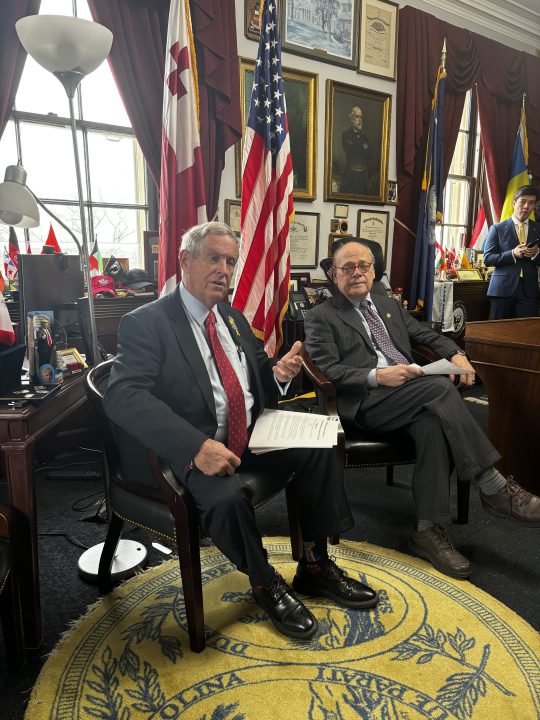[ad_1]

Republican and Democrat lawmakers are renewing efforts to pass legislation supporting Georgia, touting it as one of the best and first examples of bipartisan unity of the new Congress.
Reps. Joe Wilson (R-S.C.) and Steve Cohen (D-Tenn.), the chairs of the Helsinki Commission, reintroduced on Friday the MEGOBARI Act, which codifies sanctions against Georgian government officials for human rights abuses and undermining democracy.
The legislation comes amid mass protests against a power grab by the Georgian Dream (GD) party and Russian interference.
Cohen is also expected to introduce legislation that would bar the U.S. from recognizing the Georgian Dream as Georgia’s legitimate government.
Wilson told a small group of reporters in his office on Capitol Hill on Friday that it was a rare example of bipartisanship, and important in the context of the new Congress.
“We get sworn in in about 15 minutes, so even before being sworn in, the American congress is standing with the people of Georgia,” he said.
The legislation was repeatedly dropped in the final weeks of the last Congress for other priorities amid intensifying protests in Georgia.
Failure to pass the legislation marked a low point for Georgia’s supporters in Congress to show solidarity with protesters who have spent more than a month on the streets in freezing cold temperatures while facing water cannons and beatings from security forces.
Wilson, asked why the legislation didn’t advance, said he’d been working “over and over again” with House Majority Leader Steve Scalise (R-La.) and “there were so many other issues that were coming up, and so, it was not to be neglected, but it will be obviously a primary focus now.”
A Senate version of the bill is sponsored by the chair and ranking member of the Senate Foreign Relations Committee, Sen. Jim Risch (R-Idaho) and Jeanne Shaheen (D-N.H.).
Congressional staff said that House Speaker Mike Johnson (R-La.) – re-elected as Speaker on Friday – is supportive of the legislation and efforts are underway to attach it to one of the major government funding bills in March.
While the Biden administration has issued sanctions and travel bans against Georgian Dream officials over a range of anti-democratic actions, the legislation goes a step further by requiring the executive to investigate all members of the Georgian Dream party, and their immediate family members, for corruption or attempts to undermine Georgian sovereignty.
The legislation largely keeps in place actions the Biden administration has taken, which include suspending $95 million in government assistance over Georgia Dream’s passage of a so-called foreign agents law – a copy of Russian legislation that has a chilling effect, or could ban, the work and operations of non-governmental organizations, media organizations and civil society groups that receive funding from abroad.
Late last month the Biden administration sanctioned the political party’s honorary chairman, Bidzina Ivanshvili, a billionaire businessman who made his fortune in Russia and is largely viewed as the main power controlling the government. Ivanishvili was sanctioned for undermining democratic processes on behalf of, or for the benefit of the Russian government.
Russia invaded Georgia in 2008, backing separatist movements in the regions of South Osettia and Abkhazia and maintains troop presences in those regions. The Georgian Dream government, which rose to power in 2012, has increasingly turned itself toward Moscow, and deepened ties with China, since Russia’s full-scale invasion of Ukraine in February 2022.
Georgian Dream claimed victory in October parliamentary elections that were widely criticized as not free and not fair. Georgia’s outgoing President Salome Zourabichvili has been at the forefront of rallying international support to pressure the party to hold new elections.
Late last month Georgia Dream elected a new president, despite a boycott from opposition parties, putting in power former soccer player Mikheil Kavelashvili, and who authored the so-called foreign agents law.
“Despite the opposition boycott, the Georgian parliament has moved forward to install an openly anti-Western politician as president. The government’s attempt to reject Georgia’s friends is noted, but we will not give up on its people,” Risch wrote on the social media site X late last month.
“And while much overdue sanctions have finally been issued against Bidzina Ivanishvili for his role in the current political turmoil in Georgia, more must still be done. Again, The U.S. won’t abandon the Georgian people and their desire to have a free, fair democracy.”
[ad_2]
Source link

